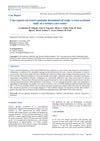 8 citations,
March 2014 in “American Journal of Pathology”
8 citations,
March 2014 in “American Journal of Pathology” Damaged hair follicles make mice more prone to skin inflammation and skin cancer after UV exposure.
 7 citations,
February 2018 in “Journal of Investigative Dermatology”
7 citations,
February 2018 in “Journal of Investigative Dermatology” Fat tissue and a specific protein are crucial for healthy hair growth and maintenance.
4 citations,
September 2021 in “Sensors” LED therapy can safely and effectively regrow eyebrows in people with frontal fibrosing alopecia.
 3 citations,
February 2008 in “Basic and clinical dermatology”
3 citations,
February 2008 in “Basic and clinical dermatology” Telogen Effluvium is a hair loss condition where treatment involves identifying and managing its triggers.
 2 citations,
February 2017 in “International Journal of Molecular Sciences”
2 citations,
February 2017 in “International Journal of Molecular Sciences” Erdr1 could be a new marker for diagnosing hair loss.
 1 citations,
July 2023 in “Journal of Clinical Medicine”
1 citations,
July 2023 in “Journal of Clinical Medicine” Different causes of beard hair loss have various treatments, including medications, lifestyle changes, and procedures to stimulate hair growth.
1 citations,
January 2020 in “Skin Appendage Disorders” Treatment with methotrexate and prednisolone led to complete hair regrowth and no relapse for 2 years.
 1 citations,
July 2018 in “Elsevier eBooks”
1 citations,
July 2018 in “Elsevier eBooks” Many treatments for hair loss show potential, but more testing is needed to confirm their effectiveness. Only minoxidil for women and minoxidil and finasteride for men are FDA approved.
1 citations,
December 2017 in “Annals of Dermatological Research” Accurate early diagnosis of Lichen Planopilaris is crucial to prevent permanent hair loss.
 September 2023 in “Journal of Cosmetic Dermatology”
September 2023 in “Journal of Cosmetic Dermatology” Finasteride was more effective than hydroxychloroquine in treating frontal fibrosing alopecia.
May 2023 in “Journal of Drugs in Dermatology” REVIVV® serum improves hair growth and reduces shedding in androgenetic alopecia.
 January 2023 in “Advances in reproductive sciences”
January 2023 in “Advances in reproductive sciences” Higher levels of the protein Pannexin-1 may play a role in hair loss in women with PCOS.
 January 2023 in “International journal of clinical medicine”
January 2023 in “International journal of clinical medicine” Women with PCOS and hair loss have lower levels of the protein gelsolin in their blood.
 August 2022 in “IntechOpen eBooks”
August 2022 in “IntechOpen eBooks” The best treatment for Frontal Fibrosing Alopecia and Lichen Planopilaris combines oral and topical medications to reduce symptoms and stop hair loss.
 February 2020 in “International Journal of Research in Dermatology”
February 2020 in “International Journal of Research in Dermatology” EPDS is a rare, chronic scalp condition that's hard to treat and needs better awareness for improved outcomes.
 January 2012 in “Yearbook of Dermatology and Dermatologic Surgery”
January 2012 in “Yearbook of Dermatology and Dermatologic Surgery” Studying acne-related syndromes helps us understand acne causes and can lead to new treatments.
 January 2010 in “Elsevier eBooks”
January 2010 in “Elsevier eBooks” The document concludes that different types of hair loss have specific treatments, and early diagnosis is crucial for preventing permanent hair loss.
 November 2005 in “Journal of Investigative Dermatology Symposium Proceedings”
November 2005 in “Journal of Investigative Dermatology Symposium Proceedings” The workshop aimed to improve hair loss disorder diagnosis and understanding.
 January 2022 in “Clinical, Cosmetic and Investigational Dermatology”
January 2022 in “Clinical, Cosmetic and Investigational Dermatology” A mix of methotrexate, corticosteroids, and topical minoxidil effectively treated severe total body hair loss, but caused stretch marks and needs long-term monitoring.
 July 2021 in “British Journal of Dermatology”
July 2021 in “British Journal of Dermatology” Low testosterone levels may contribute to female pattern hair loss in men.
 141 citations,
September 2016 in “European Journal of Dermatology”
141 citations,
September 2016 in “European Journal of Dermatology” Taxane chemotherapy can cause skin, hair, and nail side effects, which are often under-reported and can affect patient quality of life.
 69 citations,
August 2014 in “Journal of The American Academy of Dermatology”
69 citations,
August 2014 in “Journal of The American Academy of Dermatology” Trichoscopy is a quick, cost-effective tool for diagnosing different hair loss conditions.
 59 citations,
December 2016 in “Clinical, Cosmetic and Investigational Dermatology”
59 citations,
December 2016 in “Clinical, Cosmetic and Investigational Dermatology” Acne keloidalis nuchae is a tough-to-treat condition that greatly affects quality of life, especially in men of African descent.
 55 citations,
October 2003 in “Dermatologic Clinics”
55 citations,
October 2003 in “Dermatologic Clinics” Different hair care practices and conditions affect African American hair and scalp health, requiring specialized knowledge for treatment.
 53 citations,
April 2018 in “Journal of The American Academy of Dermatology”
53 citations,
April 2018 in “Journal of The American Academy of Dermatology” Cancer treatments often cause hair disorders, significantly affecting patients' quality of life, and better management methods are needed.
51 citations,
December 2017 in “Skin Appendage Disorders” Stress may trigger hair loss by affecting immune protection in hair follicles.
 46 citations,
June 2018 in “American Journal of Clinical Dermatology”
46 citations,
June 2018 in “American Journal of Clinical Dermatology” Hair loss is common in lupus patients and can be permanent or reversible, depending on the type, with various treatments available.
 45 citations,
January 2020 in “Pharmaceutical Biology”
45 citations,
January 2020 in “Pharmaceutical Biology” Dendrobium officinale polysaccharides may help with hair growth, skin moisturization, and protection against oxidative damage.
 38 citations,
January 2016 in “Indian Journal of Dermatology, Venereology and Leprology”
38 citations,
January 2016 in “Indian Journal of Dermatology, Venereology and Leprology” Trichoscopy is useful for diagnosing different types of hair loss.
37 citations,
December 2017 in “Journal of Investigative Dermatology Symposium Proceedings” Black and Hispanic women are more likely to have alopecia areata than white women.























